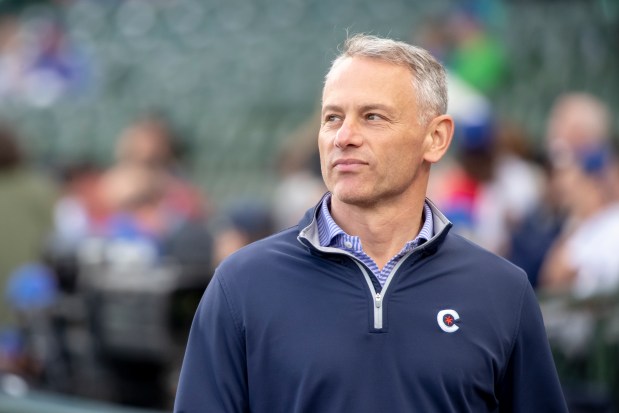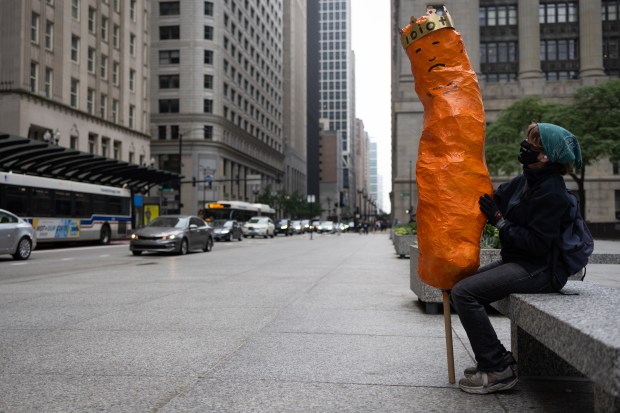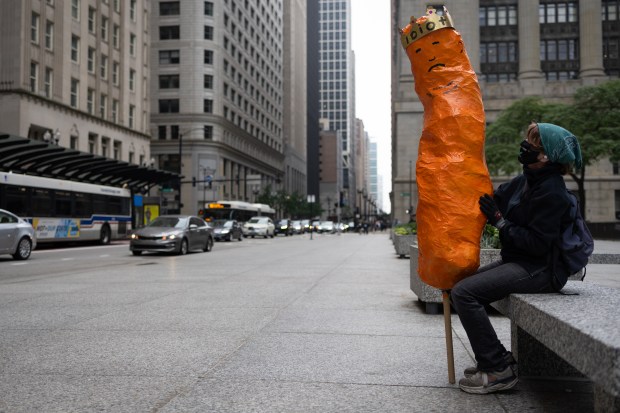MILWAUKEE — One-third of the way through the season, Chicago Cubs president of baseball operations Jed Hoyer is trying to avoid drawing too many conclusions.
As the Cubs sat at .500 entering Tuesday night’s game against the Milwaukee Brewers, their offensive production has featured two extremes. In April the offense helped overcome some key injuries, but May has been a daily grind to get anything going from the lineup.
“I didn’t think we were going to hit with guys in scoring position at the rate we were in April,” Hoyer said Tuesday, “but certainly didn’t expect this and hopefully we’ll settle in the middle somewhere between that.
“But you never know when a hot streak ends and when a cold stream begins, and vice versa. Hopefully soon we will start turning it around.”
The Cubs entered Tuesday averaging 3.29 runs per game in May, the third-fewest in the majors ahead of only the Cincinnati Reds (3.12) and the White Sox (2.96). The collective struggle to score has fallen on the entire lineup, complicating any efforts to grind through the slump.
Aside from Ian Happ starting to slug the ball over the last week, hits have been hard to come by for the Cubs, let alone extra-base hits. The Cubs owned the worst average (.211) in the big leagues this month entering Tuesday and ranked 26th in Batting Average on Balls In Play (BABIP).
Hoyer attributes that to a mix of soft contact and bad luck
“But that’s why I ultimately look at the track record of this group that was a really good offense last year, and there’s a lot of players with track records of performing above this level,” Hoyer said. “Sometimes you kind of go crazy looking at underlying numbers.
“And, hey, we have run into a lot of really good pitching. The stuff we faced this month has been really good. But ultimately you have to beat those kind of pitchers to end up where we want to go. And I think we have to rely on the track record and assume that this turns around soon.”
At some point the Cubs must consider other alternatives if the prolonged slump continues. Center fielder Pete Crow-Armstrong has raked at Triple-A Iowa since the Cubs optioned him May 21, and he’s eligible to be recalled this weekend if they decide to make a change.
Hoyer acknowledged the time could come when it’s necessary to bring up Crow-Armstrong or someone else at the expense of others’ big-league at-bats. Those are constant considerations the front office must weigh.
“One of the hardest aspects of all of these jobs is you want to be patient with guys with track records, and you know that you’re going to have these struggles at certain times of the year that you want to be patient,” Hoyer said. “But you can take that patience too far. At some point you have to sense some urgency there, and trying to figure out when that timing is is really difficult.
“We’ll try to figure out if we need to spark this offense how we can best do it.”
As much as good depth matters on the bench and in platoon roles, the Cubs need their best players to perform. No matter how Hoyer and manager Craig Counsell utilize the ancillary pieces on the roster, if Happ, Cody Bellinger, Seiya Suzuki and Dansby Swanson, in particular, don’t get going at the plate, the Cubs are in trouble.
The pressure on the pitching staff and defense is immense as long as this cold stretch continues.
“No one has been hot, ultimately — that’s a very unusual thing,” Hoyer said. “We haven’t been putting pressure on opposing teams, and as a result we’ve seen good starters who’ve pitched a long time in the games and we’ve seen the best bullpens. And that’s the bit that makes run scoring that much harder.
“Some of these things are a vicious cycle, and we need to break that cycle and start scoring runs.”





